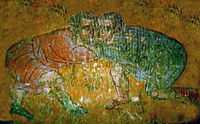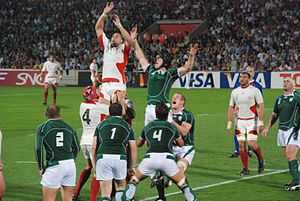Sport in Georgia

| Part of a series on |
| Georgians ქართველები |
|---|
.jpg) The Kartvelian people |
| Nation |
| Georgia |
| Ancient Kartvelian people |
|
| Subgroups |
| Culture |
|
| Languages |
| Religion |
| Symbols |
|
| History of Georgia |
Historically, Georgia has been famous for its physical education; it is known that the Romans were fascinated with Georgians' physical qualities after seeing the training techniques of ancient Iberia.[1]
Among the most popular sports in Georgia are football, basketball, rugby union, wrestling, judo and weightlifting. Other famous sports in 19th century Georgia were horse polo and lelo, a traditional Georgian game later replaced by rugby union.
Football
- See main: football in Georgia
Wrestling
Wrestling remains a historically important sport of Georgia and some historians think that the Greco-Roman style of wrestling incorporates many Georgian elements.[2] Within Georgia, one of the most popularized styles of wrestling is the Kakhetian style. However, there have been a number of other styles that are not as widely used today. For example, the Khevsureti region of Georgia has three different styles of wrestling.
Rugby

Rugby is a popular team sport played in Georgia. Rugby is considered the second most popular sport in Georgia, after football.
Motorsport
The first and only race circuit in the Caucasian region is located in Georgia. Rustavi International Motorpark originally built in 1978 was re-opened in 2012 after total reconstruction[3] costing $20 million. The track satisfies the FIA Grade 2 requirements and currently hosts the Legends car racing series and Formula Alfa competitions.[4]
Lelo burti
Winter sports
Luge
Nodar Kumaritashvili (Georgian: ნოდარ ქუმარიტაშვილი; November 25, 1988 – February 12, 2010) suffered a fatal crash during a training run prior to the 2010 Winter Olympics competition in Vancouver, Canada. He was the fourth athlete to die during Winter Olympics preparations in history, and the first in 18 years. The opening ceremonies of the Games, led by IOC President Jacques Rogge, which took place later on the fateful day, were dedicated to the 21-year-old.
See also
- Ministry of Sport & Youth Affairs of Georgia
- Sport in Abkhazia
References
- ↑ Romans erected the statue of the Iberian King Pharsman after he demonstrated Georgian training methods during his visit to Rome; Cassius Dio, Roman History, LXIX, 15.3
- ↑ Williams, Douglas. Georgia in my Heart, 1999.
- ↑ "Rustavi 2 Broadcasting Company". 2012-04-29.
- ↑ "Georgian National Broadcaster". 2012-04-30.
| ||||||||||||||
| ||||||||||||||||||